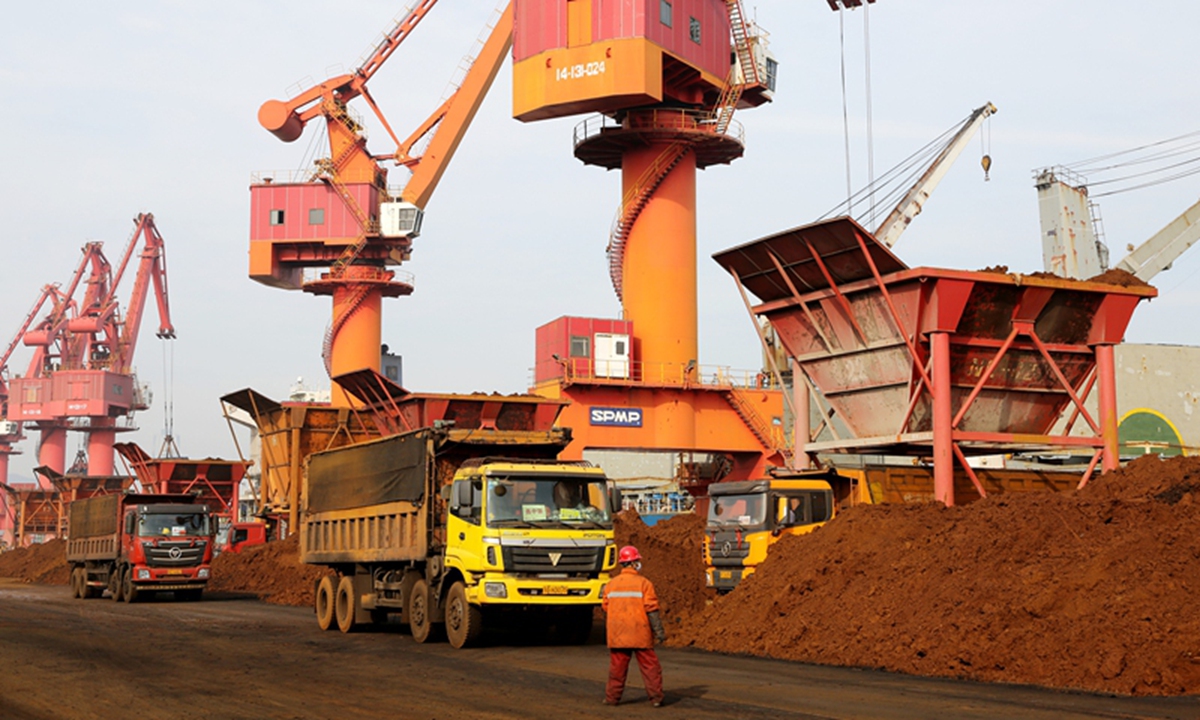Global four major iron ore producers sign contracts with Chinese ports on business involving spot trade yuan settlement

Iron ore Photo:VCG
One of the global four major iron ore producers has signed contracts with Shandong ports, which account for roughly one fourth of China's annual iron ore throughput, on settling the spot trade of iron ore in yuan this year, the Global Times learned. As such, all the global four major iron ore producers are now cooperating with the Chinese ports to settle spot trade in yuan.
Industry insiders said the trend mirrors the steady rise in the pricing power of China, the world's largest buyer of iron ore, amid the development of China's bulk commodity trade exchanges and multiple measures to elevate the country's collective negotiation power in the global market.
But they noted that spot trade is just the first step in expanding yuan's pricing power, and it is hoped that the yuan's settlement could also gain traction in long-term contracts, a major form of bulk commodity trade by large steel enterprises which is currently settled mainly in dollars.
"An Australian mining firm started yuan-based spot trade [of iron ore] last year, and we signed contracts directly with the company this year on such business. That also means that all 'global four iron ore mines' (Brazil's Vale, Australia's BHP, FMG and Rio Tinto) have begun using yuan as a settlement currency for in spot trade in Chinese ports," an industry insider at Shandong Port Group told the Global Times.
He stressed that it is a significant step in China's expanding pricing power in global market, as a result of Chinese ports' effort and government's active facilitation.
China is the world's largest importer of iron ore. In 2022, China's imports of iron ore dropped 1.5 percent year-on-year to 1.11 tons, customs data showed. But analysts expect the volume of iron ore imports could gain this year, fueled by a swift economic rebound that drives up the demand. And that is also likely to lift imports from Australia, whose economic ties with China have been improving amid a thaw in bilateral relations.
According to the industry insider, iron ore shipment from Australia now accounts for about 60 percent of China's total, while Brazil accounts for 30 percent.
In July, BHP's first shipment of yuan-based spot trade iron ore docked at Rizhao port, China's major iron ore trading port in East China's Shandong Province. It also made Rizhao the first Chinese port that supports spot trade of "all global four iron ore producers."
Overseas mines carrying out yuan settlement for spot trades at ports is helpful for the wider application of the yuan in commodity settlement and reduces the use of the greenback amid possible economic risks brought by huge exchange rate fluctuations to Chinese steel enterprises, the Shandong Port Group said in a statement sent to the Global Times.
"In the past, the Platts Iron Ore Index [by S&P Global Commodity Insights] is the benchmark price for iron ore trade, but the influence of Chinese markets has been growing in the global market, where global sellers also would refer to indexes issued by Chinese exchanges," Sun Wenfei, who is in charge of the transaction settlement department at the Shandong Board of Trade, based in Rizhao, told the Global Times on Thursday.
Shandong Board of Trade is a bulk commodity trade exchange that provides spot trade transaction covering 12 types of bulk commodities, including iron ore, coal, steel and rubber. The development of the exchange is conducive for the building of yuan pricing center for certain bulk commodities, analysts said.
Industry insiders pointed out that moving forward, Chinese companies should actively promote adopting yuan as the pricing currency for long-term contracts, which indicate that iron ore producers could have accepted the price formed by Chinese market and thus carries more weight in elevating the country's pricing power.
In July 2022, China Mineral Resources Group was set up in Xiongan New Area, North China's Hebei Province, a long-awaited move that would give China a bigger say in iron ore pricing by leveraging the country's strength as the world's largest consumer of iron ore.


